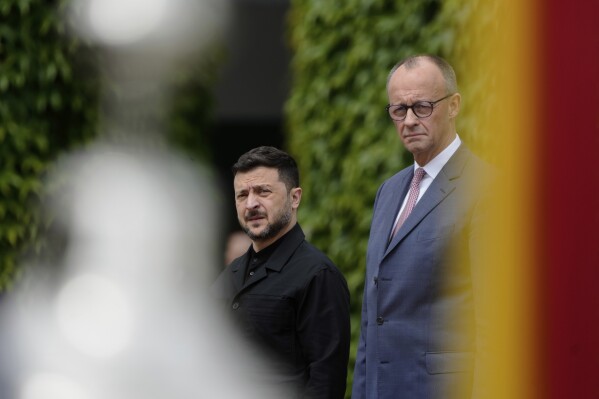Chancellor Friedrich Merz has backed an ambitious EU plan to provide Ukraine with up to €140 billion through frozen Russian assets. The proposal uses a complex bond swap mechanism driven by fears that Germany could be left shouldering Europe’s Ukraine costs as US support wavers.
“This loan would only be repaid once Russia has compensated Ukraine for the damage it has caused during this war,”
Merz wrote in a Financial Times op-ed, according to Die Welt, proposing an interest-free loan that would secure Ukraine’s defense capabilities for several years.
The proposal reveals how Trump’s return has changed European calculations. Germany, already having committed around €44 billion since February 2022, now faces carrying even more of the load as Washington steps back.
€172 billion swap
The mechanism uses Russia’s own money against them. Euroclear, Europe’s largest financial depository based in Brussels, currently holds €172 billion in frozen Russian state cash. Under the plan, that money would go directly to Ukraine, with EU bonds backed by member state guarantees replacing the withdrawn funds in Euroclear’s vaults.
“We are open to new, legally sound options for using frozen Russian assets,” Michael Clauss, Merz’s European affairs adviser, told POLITICO.
As Russian government bonds mature—reach their repayment dates—and convert to cash at Euroclear, that money would go to Ukraine while being replaced by EU bonds backed by member state guarantees. This postpones the legal question of asset seizure until the bonds mature, potentially decades from now.
German self-interest
Berlin’s enthusiasm stems from harsh fiscal reality and explicit burden-sharing concerns.
“For this comprehensive aid, there will be budget guarantees from member states,” Merz wrote, explaining that bilateral guarantees would later be replaced by EU budget backing when the new financial framework becomes available in 2028.
As POLITICO explains, the German government wants to use the “reparations loan” for military support rather than reconstruction, citing three officials familiar with the talks.
Germany’s position reflects growing concerns about its outsized role.
As Die Welt points out, the country now stands “quite alone in the first row” in Ukraine financing, and Germany has likely already surpassed the US as Ukraine’s biggest supporter.
Berlin fears that other major European countries like France and Britain are far less willing to pay, potentially making Germany’s burden too large and undermining domestic support.
“We need maximum pressure on Putin so that he finally ends his brutal war against Ukraine. The killing must end,” German Finance Minister Lars Klingbeil said, endorsing new approaches to strengthen Ukraine’s defense capabilities for years.
Political momentum and obstacles
CDU faction leader Jens Spahn welcomed Merz’s proposal, telling the newspaper Bild:
“Once again, Germany is showing leadership in Europe with Friedrich Merz. It’s time to tackle this difficult issue. It’s also a signal internally that the aggressor Russia will pay dearly for the defence of Ukraine.”
Merz will present the proposal at Copenhagen’s informal EU summit on 1 October, with a formal decision expected at the October 23-24 summit.
Success would provide Ukraine with multiyear funding certainty while reducing pressure on national budgets—exactly what Germany needs to maintain domestic support while sustaining its Ukraine leadership role.




